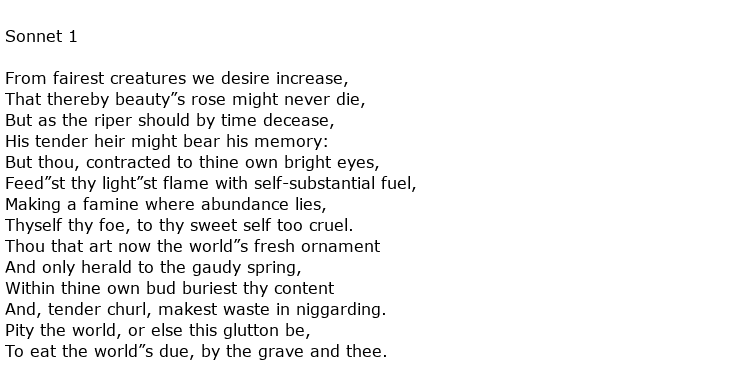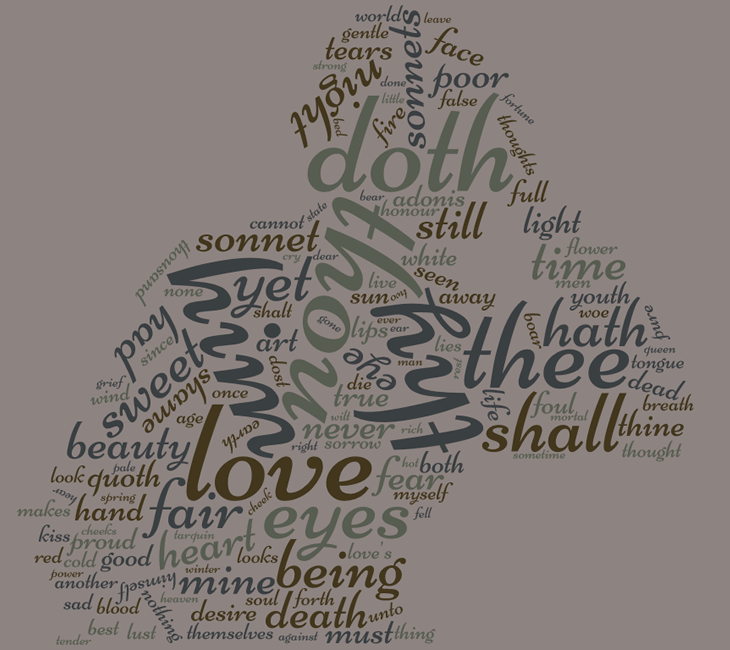 William Shakespeare (1590-1613) is one if not the most recognized poets of all time. His ability to capture both the humanistic nature of man as well as cause the mind the ascend into creative realms unknown has duly earned him the title of “The Bard”. Interestingly, when one associates the works of Shakespeare to that of the literary world, generally the connection is made to his plays of which there are 37. Comparatively, he has over 150 poems. It would therefore be a grave error for any literary scholar to overlook such works, especially those readers of the poetic arts.
William Shakespeare (1590-1613) is one if not the most recognized poets of all time. His ability to capture both the humanistic nature of man as well as cause the mind the ascend into creative realms unknown has duly earned him the title of “The Bard”. Interestingly, when one associates the works of Shakespeare to that of the literary world, generally the connection is made to his plays of which there are 37. Comparatively, he has over 150 poems. It would therefore be a grave error for any literary scholar to overlook such works, especially those readers of the poetic arts.
Making the status quo
William Shakespeare is known for 150 sonnets. A sonnet is composed of fourteen lines with a rhyming scheme. The Bard has shown that poem composition can be done in such a manner while still maintaining the integrity of the thought. Where most people can expel a thought that rhymes (one need only to think of nursery rhymes like “Mary had a little lamb”), William Shakespeare has done so with careful attention to the subject matter and the overall flow and thought of the poem. In his very first sonnet we can see how his ability to do so has rightly earned him the esteemed position of the status quo.

The rhyme scheme here would be A,B,A,C,B,D,B,D,E,F,E,F,G,G. This is a commonly used methodology used in sonnets today.In writing it is referred to as the English or the Shakespearean sonnet. If looking at the sound of the sentences there is a distinct verbal rhythm apart from the ending rhyme that flows from the poem. Oration of this sonnet will reveal this.
It is all about love
Compared to the diversity of some of the later poets, one may think that William Shakespeare’s poems are a bit lacking in their subject scope. However, one would do well to consider the time era from whence these poems were written. During this era, literary professionals were hard pressed to make a living. Plays (for which William Shakespeare is best known) were looked upon more as a hobby than a professional career and so the money for such works was not substantial to live off of. Poems were considered to be something for the nobles and upper society. Being that parchment was also considered to be a sacred material at that time (mainly due to the scarcity to secure large quantities at one time), the lines of the poems written had to be catered specifically to sell. What better to sell than a love sonnet during the Elizabethan Era?
The Two Unknowns
Unknown to a great many, are the two narrative poems of William Shakespeare. These two poems were written around the same time period (1593 and 1594) of his career. It could be concluded that these two poems were composed as a test. Being that there are no other narratives it can also be concluded that William Shakespeare did not see the merit in composing such lengthy poems and therefore focused on where money could be made. It is only in the later years after an artist is gone that the cultural world seems to embrace the artistry of one’s work. It would appear that such rings true with these two poems.
Venus and Adonis
The earlier of the two poems, William Shakespeare truly shows that he can present a story in poetic form. The poem was constructed for as he put it “so noble a god-father”, the earl of Southampton. Again, we see that there is the strong story of love and conflict which tends to radiate throughout his work. However, another key aspect of William Shakespeare’s work can be seen here and that is his use of the mythological. Where Venus is a common mythological deity, one will find that other such beings are introduced not only in his sonnets and poems but also within his plays. With such, here lies the tie with the ancient muses and the Elizabethan poets.
The Rape of Lucrece
Not uncommon to William Shakespeare, this poem focuses on a murder and the pursuit of lover. One can see the clear association with his play Hamlet (written around 1590) as well as Macbeth (written around 1603) within this work. Being as the poem was written early in his career, one may conclude that this poem served as a starting point for the later plays. It would be foolish for the seasoned reader not to conclude that such associations with these later works were deliberately constructed from the format and content of this work.
The Bard
Those which are looking for a poet to aspire to would do well to follow the writings of William Shakespeare. The sonnets allow the poet to practice tactful word play while the narrative poems provide us with an exercise in intricate storytelling.
Readers of poetry would be greatly benefited from reading the sonnets of Shakespeare. Many of the “modern” poets have read and in some cases mimicked his work very closely. As a serious poet, one cannot abandon the building blocks for which the poetic area was built. Being that William Shakespeare has earned the title “The Bard”, we would all be wise to listen with earnestness to the words he has written.


